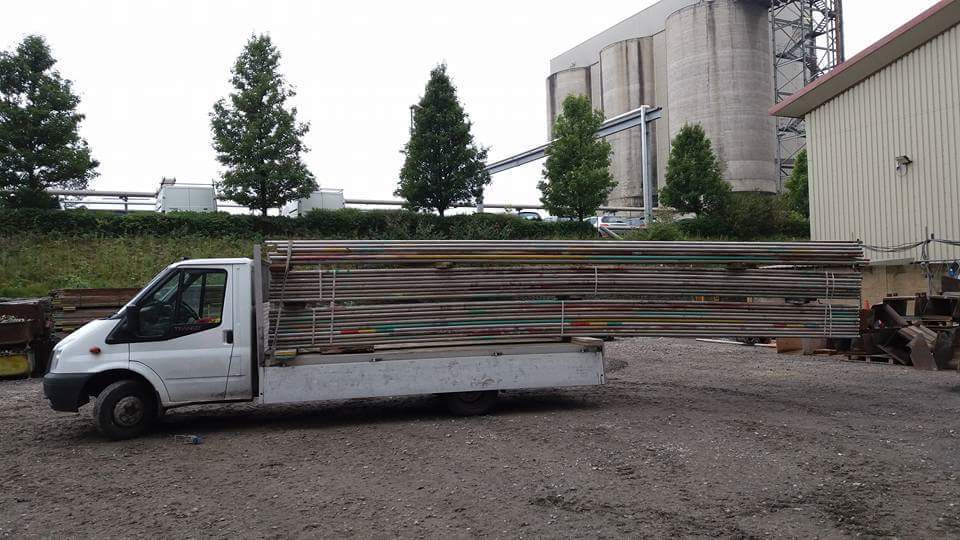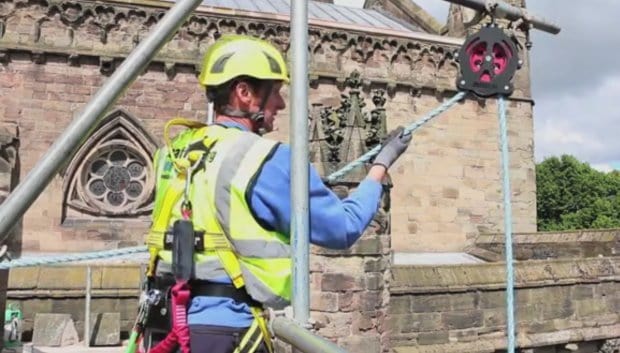Silverstar uses Layher Allround for Sheffield project
Oldham based Silverstar Scaffolding is supplying Layher’s Allround scaffolding for new student accommodation in Sheffield, UK.
The project is seeing the 1960’s Telecom House in Sheffield being transformed into 366 Vita Student studios with the 14-storey landmark building set to grow with the addition of a new 15th floor. The project has had to accommodate a pedestrian walkway and an adjacent five-storey car park which, effectively, acts as a podium from which the residence rises above.
Speaking to the the KHL Group Tony Clarkin, managing director of Silverstar Scaffolding said: “Considerations that had to be accommodated included a significant gradient at ground level and restrictions associated with building directly from the top level of the car park,”
Pedestrian access is being maintained across the front of the building by the creation of a protective canopy using triple aluminium Layher beams while on the car park, Silverstar Scaffolding has built the scaffold from specially installed steel sections which were designed to minimise contact with the surface.
“The scaffold is particularly effective in areas where the façade layout prevented mast climbers being used,” said Sean Pike, Layher’s UK managing director. “Each scaffold lift was fully fitted out with Layher decking to give permanent access to all working faces with two full height Layher stair towers also installed by Silverstar within the scaffold frame.”
Source: access-international
Vita Student studios with the 14-storey landmark building set to grow with the addition of a new 15th floor. The project has had to accommodate a pedestrian walkway and an adjacent five-storey car park which, effectively, acts as a podium from which the residence rises above.
Speaking to the the KHL Group Tony Clarkin, managing director of Silverstar Scaffolding said: “Considerations that had to be accommodated included a significant gradient at ground level and restrictions associated with building directly from the top level of the car park,”
Pedestrian access is being maintained across the front of the building by the creation of a protective canopy using triple aluminium Layher beams while on the car park, Silverstar Scaffolding has built the scaffold from specially installed steel sections which were designed to minimise contact with the surface.
“The scaffold is particularly effective in areas where the façade layout prevented mast climbers being used,” said Sean Pike, Layher’s UK managing director. “Each scaffold lift was fully fitted out with Layher decking to give permanent access to all working faces with two full height Layher stair towers also installed by Silverstar within the scaffold frame.”
Source: access-international Construction firm acquires Craft Scaffolding Ltd
Chigwell Construction has purchased Craft Scaffolding Ltd after the firm became frustrated with constantly being let down by subcontractors.
The Essex based construction company’s latest acquisition will see Craft Scaffolding rebranded as Chigwell Craft Scaffolding Ltd. Chigwell set up a roofing division last year which now has in excess of twenty directly employed roofers. Speaking to the Construction Enquirer, Managing director Dean Floyd said: “We were being let down when using subcontractors for scaffolding mainly because the industry is so busy. “It seemed the obvious solution to bring scaffolding in-house via this acquisition.” Craft Scaffolding has been a member of the Chigwell supply chain for many years and director Andrew Hollands retains a 50% shareholding. Craft has an annual turnover of £2.9m which is forecast to rise to £5m within the next 12 months. The deal takes Chigwell Group’s annual turnover to just under £50m.TRAD & Leach’s introduce revolutionary NEW Braked Pulley Wheel
TRAD is always looking for ways to improve safety and identified an opportunity to dramatically reduce on-site accidents and injuries when using a traditional Gin Wheel.
Continuing in TRAD’s quest for an ever-safer working environment they identified a way to transform the Gin Wheel into a device suitable for the 21st Century – changing the way site workers handle the lifting and lowering of heavy items and dramatically reduce the risk of personal injury.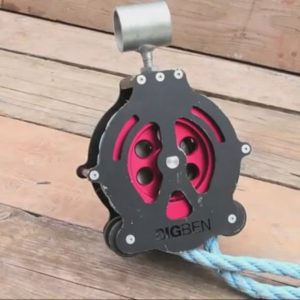 Working in conjunction with Leach’s and utilising their technical and manufacturing expertise they have developed the ground-breaking Big Ben Pulley Wheel – revolutionising the lifting and lowering of heavy items on site – saving lives and minimising workplace injuries forever.
By introducing this innovative, braked pulley workplace accidents will be a thing of the past, with less effort and greater control to result in less fatigue and improved efficiency. Even if the rope is released, the pulley has a built-in descent control that gently and smoothly lowers items to the ground. The pulley also allows finger-tip control with the operator being able to stop and start descent at any time with the smallest of effort. Tough, marine-grade stainless steel brake and durable galvanised and anodised parts in a fully-enclosed die-casting ensures durability in the toughest environments – on land or at sea!
Working in conjunction with Leach’s and utilising their technical and manufacturing expertise they have developed the ground-breaking Big Ben Pulley Wheel – revolutionising the lifting and lowering of heavy items on site – saving lives and minimising workplace injuries forever.
By introducing this innovative, braked pulley workplace accidents will be a thing of the past, with less effort and greater control to result in less fatigue and improved efficiency. Even if the rope is released, the pulley has a built-in descent control that gently and smoothly lowers items to the ground. The pulley also allows finger-tip control with the operator being able to stop and start descent at any time with the smallest of effort. Tough, marine-grade stainless steel brake and durable galvanised and anodised parts in a fully-enclosed die-casting ensures durability in the toughest environments – on land or at sea!
Revolutionary features include:
- Easy to operate.
- Smooth, controlled descent.
- SWL of 50 kg.
- Ensures safe raising and lowering of goods.
- Fully enclosed for safety and durability.
- Built in descent control.
- Tough construction.
- Unit weight of only 6.5kg.
Grip It MAX
Grip It® MAX from Polyco.
The value of a task, it is said, lies in its difficulty, and only by tackling difficulty head on can potential be realised. With this principle in mind the expert product development team at Polyco set out to create a best-in-class dry-grip glove offering unrivalled comfort. Two years and several surmounted difficulties later, the Grip It MAX was born – its value beyond doubt and its potential beyond expectation. Grip It MAX from Polyco uses the latest injection moulding technology with TPE (thermoplastic elastomer) to provide an unrivalled and best-in-class grip. Designed and manufactured in the UK using a high precision manufacturing process, it offers consistent product quality with superior wearability and comfort. The ergonomic design with underslung thumb matches the natural position of the hand at rest to allow for ease of movement, and the tapered fingers ensure that dexterous tasks can be performed with ease. The three-quarter TPE coating which has been reinforced in critical areas, offers exceptional abrasion resistance delivering maximum protection; it has a unique and specially designed tread pattern on the palm and fingertips which contributes to its exceptional gripping ability For more information please visit: PolycoCITB to fund new scaffolding training center in Scotland
The CITB announced yesterday that £500,000 of new funding is available to train scaffolders in the North East of Scotland.
In a press release the Construction Industry Training Board (CITB) announced that the money is being made available due to increasing demand for scaffolders and a lack of training in the region. At present, would-be scaffolders travel to Inchinnan, Renfrewshire, for CITB training – but now top quality courses will be brought to where they are needed most. CITB is encouraging training providers to bid for the funding, with the new facility scheduled to open in September 2016. Alex Birks, CITB’s Head of Strategic Training Provision, said: “There is growing demand for scaffolding courses in the North East of Scotland, which is why we are pleased to fund a new training facility in the region. “The centre will provide young people with superb opportunities to learn new skills and start rewarding, fulfilling careers in construction. The successful bidder will work with CITB and their partners to provide high quality training and help meet the skills needs of the construction sector in the North of Scotland.”CISRS unveils range of new logos
CISRS have today unveiled a range of new logos to help modernise their branding and have announced a planned re-design of the CISRS website.
 The new logos have been reportedly designed in-house that incorporates the company’s colours orange, black and white.
The range of logos includes:
* Orange logo with black company name,
* Orange logo with white company name, and
* Black logo with orange company name.
The new logos will be forwarded to CISRS training providers initially and then rolled out throughout the rest of the year, with a view to complete integration in early 2016.
CISRS Scheme Manager Dave Mosley said: “We have had the old silver and white CISRS logo for many years now and felt the time had come to modernise and bring it into line with the orange, black and white designs of our advertising campaigns. The rotation of the colours will provide a “home and away strip” scenario and will be helpful particularly if the training providers wish to use the new logo alongside their own corporate colours or branding.
“We are aware the integration of a new logo can take time to achieve, but hope that by the early part of 2016, everyone will be using the new designs, and that they will be well-received by the scaffolding, training and wider construction industries. The CISRS website, which will also be receiving a re-vamp, will include the new logos.”
The new logos have been reportedly designed in-house that incorporates the company’s colours orange, black and white.
The range of logos includes:
* Orange logo with black company name,
* Orange logo with white company name, and
* Black logo with orange company name.
The new logos will be forwarded to CISRS training providers initially and then rolled out throughout the rest of the year, with a view to complete integration in early 2016.
CISRS Scheme Manager Dave Mosley said: “We have had the old silver and white CISRS logo for many years now and felt the time had come to modernise and bring it into line with the orange, black and white designs of our advertising campaigns. The rotation of the colours will provide a “home and away strip” scenario and will be helpful particularly if the training providers wish to use the new logo alongside their own corporate colours or branding.
“We are aware the integration of a new logo can take time to achieve, but hope that by the early part of 2016, everyone will be using the new designs, and that they will be well-received by the scaffolding, training and wider construction industries. The CISRS website, which will also be receiving a re-vamp, will include the new logos.” NASC President speaks out about his Apprenticeship Challenge
Back in 2013 the then new NASC President, Kevin Ward unveiled a grand plan to challenge it’s members to create a minimum of 400 new scaffolder apprentices during his two-year term.
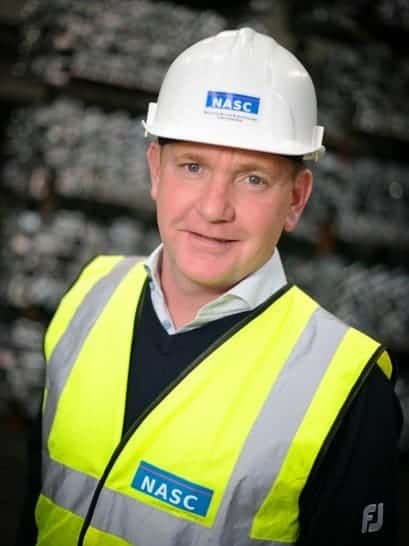
Fast-forward to the present day with just a few months left of his presidency Kevin’s challenge is well on target to become a success, not only will our industry benefit from Mr Ward’s challenge but The Teenage Cancer Trust are set to receive a minimum donation of £40,000 from participating NASC member companies.
Mr Ward who was a former scaffolding apprentice himself took time out of his busy scheduled to talk to us about his apprenticeship challenge.
Just as a recap please explain to our readers your apprentice challenge you set 2 years ago. How and why did your apprentice challenge come about? Did the NASC feel there was an inherent risk of a national shortage of CISRS trained scaffolders?
“It was an incredible honour for me when I was asked by my peers if I would take up the role of NASC President for a two year term. Indeed it was right up there with one or two of my other proudest achievements in my career within the Scaffolding & Access Industry. Aside from the day to day responsibilities expected from me in the role of President I decided early on that I would embark on a challenge of sort that could benefit the industry and be the focus of my two-year term”.
[quote_left]“Apprentices have always been the life-blood of our industry”[/quote_left]”It was apparent that the first signs of a recovery in the economy were starting to show and it made me reflect on skills shortages that were experienced across the construction sector when we came out of the last recession, when significant numbers of the workforce left the sector for good to seek other work. We were too slow to react to the turnaround in the economy and put plans in place to ensure an adequate supply of skilled labour would be available for our future requirements. With this in mind and having been employed at Scaffold Erection Services Ltd (SES) for many years where we have always been passionate and active in the CISRS Scaffolding apprentices scheme, also coupled with my being a former apprentice scaffolder myself, it was a no brainer for me to create a challenge that would hopefully help to reinvigorate the numbers of apprentices being put through the CISRS Scaffolding Apprentice Scheme by NASC Members – the ‘NASC New Apprentices Challenge’ was born and a stiff target of 400 new apprentices was set”.
“After a short period of reflection I thought that it could also be a fantastic opportunity for NASC members to give some badly needed support to people who have been less fortunate in life and I decided that we would try and raise some much needed funds for the charity ‘Teenage Cancer Trust’ by piggy-backing some sponsorship onto the the challenge”.
How does the recruitment of new apprentices help our industry ?
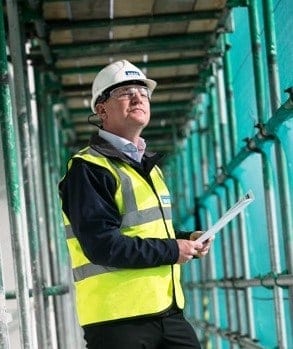
“The CISRS Scaffolding Apprentice Scheme is this ‘route of choice,’ where excellent levels of support are given and the highest standards of training are delivered whilst all being set within a realistic time frame that ensures highly skilled and motivated individuals are the product.”
Nowadays the large majority of young people looking for future careers are overlooking the construction sector. How do you think our industry could improve its image to attract more young people to enrol to become apprentice scaffolders?
[quote_right]“One of the more troubling aspects has been the almost continuous cuts in funding for apprenticeship”.[/quote_right]”There has already been significant work and investment on the marketing side by the NASC and many of CISRS approved training centres. However we cannot afford to be complacent, we must continue to get the message out there that the Scaffolding & Access industry is an increasingly professional and safe environment to work in and can offer significant personal and financial rewards to the individuals we are trying to attract”.
“One of the more troubling aspects has been the almost continuous cuts in funding for apprenticeships. This has undoubtedly led to a reduction in the number of places made available by the training providers to employers for new apprentices. This is a regular complaint I hear from members all over the country so we must continue to work with other stakeholders and make sure sufficient funding remains in place to ensure our standard setting CISRS apprentice scheme continues to flourish”.
With your apprentice challenge set to be a success within the NASC contracting members, would you also urge the wider industry of non-members to lead by your example and continue to employ new apprentices.
“With just under 3 months of the challenge remaining there have been occasions when it appeared that we would not make it to the target number of 400 new apprentices. However at the last count we have very nearly got over the finishing line”.
“I have always had faith that the membership would rally and support the challenge and I am delighted and very grateful that they have collectively ‘stood up to the plate’. Whilst it is encouraging that NASC members have taken on large numbers of apprentices via the CISRS scheme it has become apparent to me that many non-member companies have also demonstrated a strong commitment to creating the skilled workforce of tomorrow and have also put through good numbers of apprentices through the scheme and they also deserve recognition for this commitment”.
“The final icing on the cake will hopefully be that we will have also raised a figure in the region of £50,000 for Teenage Cancer Trust via the very generous NASC member companies who have sponsored the challenge”.
“In summary I hope we can continue forward with this positive trend, after all it seems like a win win for all to me – Employers, Training Providers, a charitable good cause and not mention most importantly for me – The Apprentices!”
PASMA appoints new marketing and communications officer
Gary Chudleigh becomes the new Marketing & Communications Officer for PASMA.

